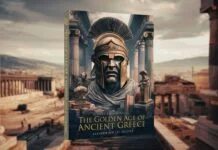Unearthing Ancient Civilizations: The Significance of Greek Curses
In the heart of classical antiquity lies a fascinating intersection of death, commemoration, and the supernatural—Greek curses. These inscribed messages, discovered on tombstones and grave markers, reveal much about the beliefs and customs of ancient societies. By examining their purpose and significance, we gain insights into the complex relationship between the living and the dead.
The Guardians of the Grave: Curses as Protective Measures
The notion of safeguarding the deceased was paramount in ancient Greek culture. One prevalent function of Greek curses was to protect grave monuments from desecration or theft. Individuals often inscribed curses directly onto tombstones, seeking divine intervention to deter potential wrongdoers. These offerings to the gods acted as both a warning and a plea, ensuring that the sanctity of the resting place remained undisturbed.
Invoking the Past: Curses to Call Upon the Deceased
In stark contrast to protective curses, others served a more haunting purpose: invoking the dead. These inscriptions reflected the belief that the deceased could still interact with the living world. The living would call upon the spirits for guidance or vengeance, blurring the lines between life and death. Such curses allowed individuals to maintain a connection with their ancestors while simultaneously demonstrating reverence and respect.
The Power of Words: The Language of Greek Curses
The language employed in these curses was intentional and laden with meaning. Each word was chosen carefully, often steeped in a sense of urgency and power. The inscriptions typically invoked deities or the spirit of the deceased, showcasing the intertwining nature of religion and daily life in ancient Greece. Crafting a curse required not only a firm understanding of language but also of the cultural context that gave these words their potency.
Curses: A Reflection of Society’s Values
The existence of Greek curses also provides a lens through which we can examine societal values. They reveal the communal fears and concerns of ancient Greeks, as well as their understanding of morality and justice. The invocation of the curse reflected the desperation of those left behind, demonstrating how deeply the loss of a loved one could affect the living.
Superstitions and Beliefs: The Role of the Divine
The prevalence of Greek curses underscores the profound belief in the supernatural during ancient times. People sought protection and guidance from divine entities, illustrating a society steeped in superstition. This relationship with the gods created a system of checks and balances—ensuring that both the living and the dead played critical roles in maintaining order.
The Unwritten Law: Justice through Curses
In a world without modern law enforcement, Greek curses acted as a form of justice. When an individual’s rights were violated, inscribing a curse against the wrongdoer was a way to seek retribution. It reflected the belief that justice would be served, whether by divine intervention or the wrath of the deceased.
Curses in Context: Historical Significance
The historical importance of Greek curses cannot be overstated. They shed light on ancient rituals and burial practices, helping us understand how societies honored their dead. The study of these inscriptions provides historical context that enriches our comprehension of ancient Greek life and culture.
Greek Curses as Modern Echoes: Continued Fascination
The allure of Greek curses extends beyond academia; their themes resonate with contemporary audiences. The fascination with the paranormal and the desire to connect with the deceased persist in modern culture. This continuity speaks to the enduring nature of human experience and the universal quest for answers regarding life and death.
A Gateway to the Past: Archaeological Discoveries
Recent archaeological discoveries continue to unveil ancient Greek curses, further enriching our understanding of this captivating aspect of their culture. Each curse unearthed offers a glimpse into the past—revealing stories of love, loss, and longing that transcend time. The study of these artifacts invites us to consider the complexities of loss and mourning in our own lives.
Curses and Culture: An Artistic Expression
The artistry of Greek curses often reflects the cultural aesthetics of their time. Intricate designs and symbols accompanied the written inscriptions, adding a layer of visual meaning to the words. This interplay between text and imagery reveals how deeply ingrained these beliefs were in the fabric of ancient society.
Concluding Thoughts: The Lasting Legacy of Greek Curses
In examining Greek curses, we uncover more than just words inscribed on stone. These ancient messages reveal the human condition—our fears, hopes, and connections to those who have passed on. As we delve into the past, we find reflections of ourselves in the desires for protection, justice, and communion with the dead.
Embracing the Ancient: Learning from the Past
As we reflect on the function of Greek curses, we can appreciate the lessons they impart. They remind us of the complexity of grief and the importance of remembering those who came before us. By understanding these ancient practices, we can foster a deeper respect for our own histories and the legacies we create—one inscription at a time.
In exploring the world of Greek curses, we not only gain historical knowledge but also connect with the timeless human experience. Whether as a means of protection or a form of communication with the deceased, these ancient inscriptions resonate with many of our own beliefs and practices today.





















